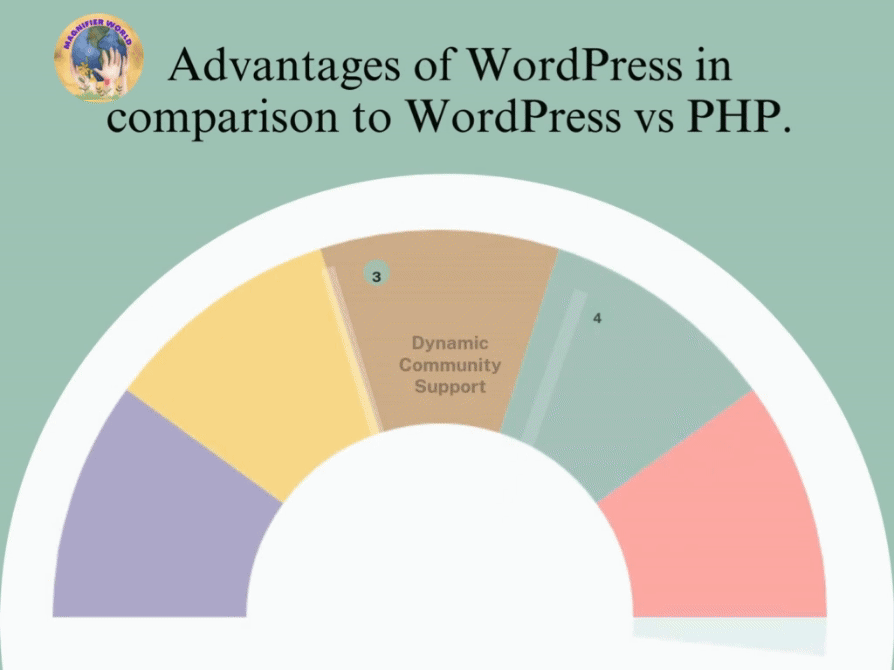Introduction: WordPress vs PHP
Have you ever been stuck in a dilemma while choosing a tool between WordPress vs PHP while developing your website? Within the world of website advancement, two unmistakable names regularly come up in talks: WordPress vs PHP.
Both are broadly utilized and offer one-of-a-kind highlights and functionalities. However, it is vital to understand the contrasts between these two advances to make an informed decision about which one is best suited for your site needs.
In this article, we are going investigate WordPress vs PHP, comparing their highlights, preferences, and impediments to assist you make an educated choice.
I. Understanding WordPress: WordPress vs PHP
Let’s understand what WordPress is before comparing WordPress vs PHP.
“WordPress is a well-known content management system (CMS) that powers millions of websites around the world. It gives a user-friendly interface, permitting even non-technical clients to construct and manage websites effortlessly”.
WordPress offers a tremendous library of themes and plugins, empowering clients to customize their websites broadly.
It also includes features like blogging, SEO optimization, and e-commerce functionality. It is basically a tool with a predefined framework that allows you to design websites with a click by just drag-&-drop command.
Advantages of WordPress: WordPress vs PHP

Advantages of WordPress in comparison to WordPress vs PHP.
- User-Friendly: WordPress’s intuitive interface makes it easy for beginners to create and update content without requiring extensive coding knowledge.
- Extensive Plugin and Theme Library: WordPress boasts a wide cluster of themes and plugins, empowering clients to upgrade their website’s appearance and functionality.
- Dynamic Community Support: WordPress incorporates an endless community of designers and clients who contribute to its improvement and give back through forums, instructional exercises, and documentation.
- SEO-Friendly: WordPress offers built-in features and plugins that help with search engine optimization, making it simpler for websites to rank higher in search engine results.
- E-commerce Capabilities: With plugins like WooCommerce, WordPress can transform into a fully functional e-commerce platform.
Limitations of WordPress: WordPress vs PHP
Limitations of WordPress in comparison to WordPress vs PHP.
- Limited Customization: While WordPress provides numerous themes and plugins, customization options can be limited, requiring advanced coding skills for complex modifications.
- Security Dangers: Due to its notoriety, WordPress may be helpless to security dangers if it is not regularly updated and secured.
- Execution and Versatility: WordPress may encounter execution issues when taking care of expansive sums of activity, requiring extra optimization measures.
- Vulnerability to Plugin Incompatibilities – While plugins provide extensive functionality to WordPress websites, they can occasionally introduce compatibility issues.
As plugins are developed by different authors, conflicts may arise between them, leading to unexpected errors or security vulnerabilities.
It’s crucial to choose plugins carefully, ensuring they are regularly updated and compatible with your WordPress version, theme, and other plugins to minimize the risk of conflicts and potential site instability.
II. Understanding PHP: WordPress vs PHP
Understanding PHP in context to the comparison of WordPress vs PHP.
PHP (Hypertext Preprocessor) is a widely used scripting language that powers dynamic websites. It is the backbone of WordPress, providing the server-side scripting necessary for WordPress to function effectively.
Advantages of PHP:
Advantages of PHP in comparison to WordPress vs PHP.
- Flexibility: PHP is a flexible language that can be utilized for a wide extent of web advancement projects, not just WordPress. It coordinates well with different databases, including MySQL, making it appropriate for building dynamic and intuitive websites.
- Broad Systems: PHP incorporates a tremendous collection of systems, such as Laravel and Symfony, which streamline web advancement by giving pre-built modules and tools.
- Huge Community and Documentation: PHP encompasses an enormous community of designers, making it less demanding to discover support, resources, and documentation. The abundance of instructional exercises and forums streamlines the learning preparation for beginners.
- Execution: PHP is known for its amazing execution, because it may be a server-side dialect that executes rapidly and productively.
- Wide Hosting Support – PHP enjoys extensive hosting support from numerous web hosting providers. The majority of hosting companies offer PHP as part of their facilitating packages, making it simple to discover a dependable hosting arrangement for your PHP-based site.
- This wide accessibility of hosting alternatives guarantees adaptability and permits you to select a facilitating supplier that suits your particular needs, whether it’s shared facilitating, VPS (Virtual Private Server), or committed hosting.
Limitations of PHP:
Limitations of PHP in comparison of WordPress vs PHP.
- Steep Learning Curve: PHP can be challenging for beginners to grasp, especially those with limited programming experience. Its syntax and structure may require time and effort to understand fully.
- Security Concerns: Ineffectively composed PHP code can result in security vulnerabilities, making it crucial to follow best practices and follow to security guidelines.
- Need for Built-in Features: Whereas PHP gives an establishment for dynamic websites, it does not offer built-in features like CMS functionality, e-commerce capabilities, or a user-friendly interface, unlike WordPress.
III. Choosing the Right Platform
The choice between WordPress vs PHP depends on your specific website requirements and development experience. In case you prioritize ease of utilization, a wealthy library of subjects and plugins, and a user-friendly interface, WordPress is a fabulous choice.
It engages clients to make and oversee websites without broad coding information, making it perfect for bloggers, small businesses, and people seeking a hassle-free site setup.
On the other hand, if you have got web development experience or require more adaptability and customization choices, PHP may be the way better choice.
PHP provides a solid foundation for building dynamic websites and offers extensive frameworks that simplify development tasks. It is suitable for larger projects, complex web applications, and websites that require custom functionality beyond what WordPress can offer.
Consider the following factors when making your decision between WordPress vs PHP:
- Site Complexity: If your site requires advanced customizations, complex functionalities, or particular features that are not promptly available in WordPress, PHP gives you more control over the advancement process.
- Technical Abilities: If you’ve got programming experience or access to a talented engineer, PHP gives a more extensive run of possibilities for customization.
- In any case, if you’re a non-technical client or have restricted coding information, WordPress’s user-friendly interface and broad plugin ecosystem make it simpler to form and manage your website.
- Time and Budget: WordPress can altogether decrease improvement time and costs because it offers plenty of pre-built topics and plugins that can be effectively coordinated into your site. PHP improvement, on the other hand, may require more time and assets to construct a completely functional and customized website from scratch.
- Versatility and Execution: If you expect overwhelming activity or plan to scale your site in the future, PHP’s execution focal points and capacity to handle bigger workloads make it a more reasonable choice. WordPress may require additional optimization measures to ensure optimal performance under high-traffic conditions.
Conclusion to WordPress vs PHP
Both WordPress vs php have their strengths and weaknesses, and the decision between the two ultimately depends on your specific website requirements and development expertise.
“WordPress exceeds expectations in user-friendliness, a tremendous plugin library, and speedy website setup, making it an amazing choice for apprentices and those looking for effortlessness”.
PHP, on the other hand, offers flexibility, customization choices, and way better execution for complex ventures, making it more reasonable for experienced engineers and larger-scale websites.
Carefully consider your website’s complexity, technical aptitudes, budget, versatility needs, and desired level of customization before making a choice.
Whether you select WordPress vs PHP, both platforms have demonstrated their worth within the web development world, and with the proper approach, you’ll make a fruitful and functional site that meets your objectives and targets.
Technical Suneja




